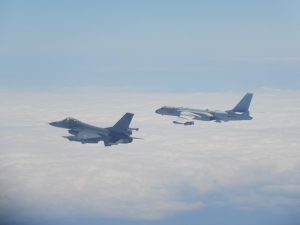Taiwan’s air force — officially known as the Republic of China Air Force — scrambled fighters on Sunday to intercept Chinese People’s Liberation Army Air Force (PLAAF) aircraft that Taipei said flew around the island. Taiwan’s Ministry of National Defense condemned Beijing’s move as a threat to peace in the region.
According to the Taiwanese Ministry of National Defense, PLAAF Shenyang J-11 fighters and Xian H-6 bombers flew south of the island, first through the Bashi Channel, which separates Taiwan from the northern Philippines, into the Western Pacific, and then returning to Chinese airspace through the Miyako Strait, a passage that traverses Japan’s Ryukyu Islands. A Shaanxi KJ-500 airborne early warning and control aircraft accompanied the J-11 fighters and H-6 bombers.
In recent years, the PLAAF and the People’s Liberation Army Navy Air Force (PLANAF) have spent considerable time conducting exercises and transits of these strategic areas. Beijing sees control over the Bashi Channel and the Miyako Strait as critical for any future conflict in the Taiwan Strait.
In a statement, the Taiwanese Ministry of National Defense criticized China’s operations in these areas in recent years. “During this period, the national military appropriately used air reconnaissance aircraft and air defence forces in accordance with combat readiness regulations,” it said.
“The Chinese Communist’s long-range far-out-at-sea missions have impacted regional security and stability and endanger the peace and welfare shared by all parties in the region,” the ministry added.
The Taiwanese side said that the Chinese aircraft violated a tacit agreement between Beijing and Taipei that military aircraft and warships from both sides will refrain from crossing the median line in the Taiwan Strait — the mid-way point between the coastlines of both sides.
Tensions between China and Taiwan spiked in 2016 with the election victory of President Tsai Ing-wen and the independence-leaning Democratic Progressive Party. Tsai won another resounding mandate in elections last month, winning the highest-ever vote total in any election in Taiwan since the island transitioned to democracy.
China regards self-governing Taiwan as part of its territory. Following her election victory this January, Tsai emphasized Taipei’s sovereignty.
“This election result carries an added significance. They have shown that when our sovereignty and democracy are threatened the Taiwanese will shout our determination even more loudly back,” Tsai said.
“With each presidential election, Taiwan is showing how much we cherish our free democratic way of life and how much we cherish our nation,” she added.

































